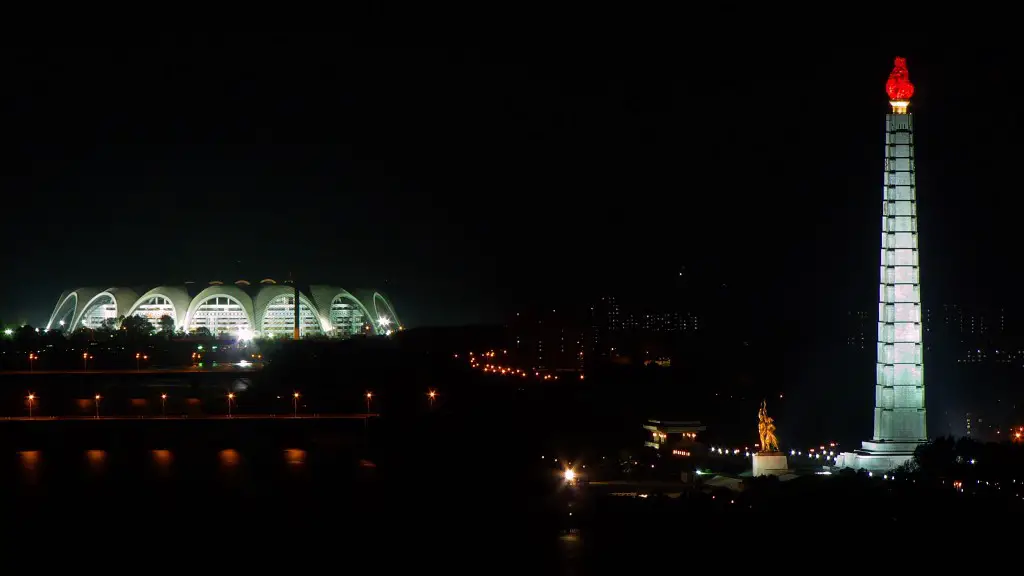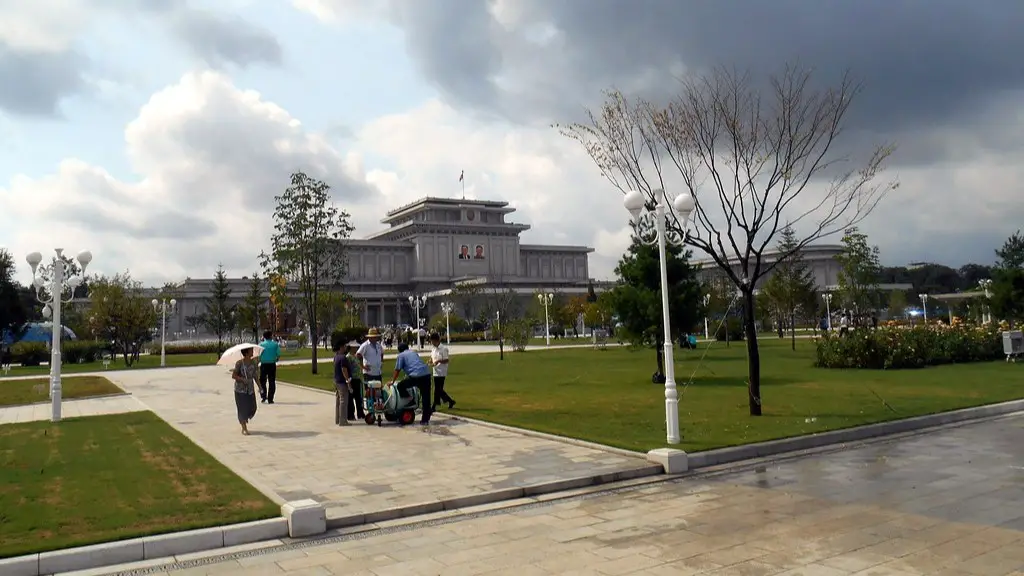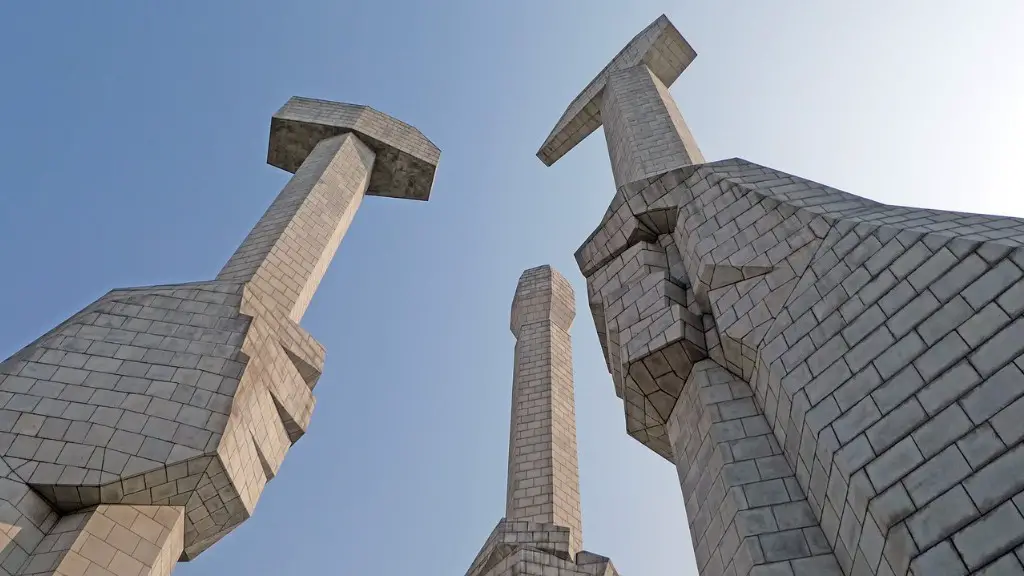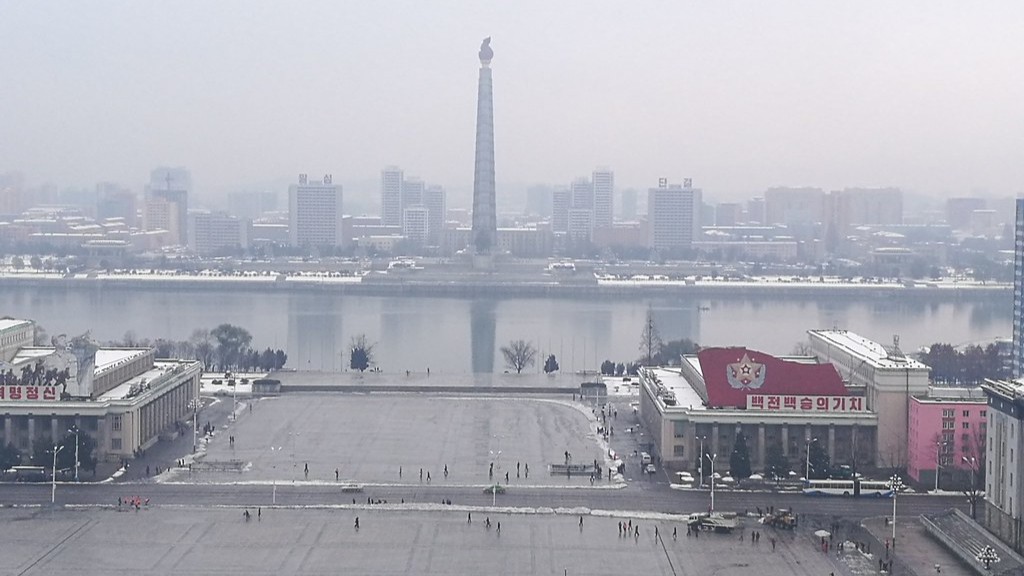Sanctions imposed against North Korea, considered by many to be one of the most repressive and isolated countries in the world, are a hugely contentious subject. These sanctions, typically imposed by powerful industrialized nations, are intended to restrict the North Korean economy in order to bring about regime change or compel Pyongyang to negotiate on issues of security and human rights. But do sanctions actually work on North Korea?
Proponents of economic sanctions contend that these measures are an effective way to force the regime to make concessions, citing the country’s dependence on imported goods and the preceding negotiations with the United States in the early 2000s as examples. While it is true that North Korea cannot survive economically without access to outside resources, there is also evidence to suggest that sanctions are largely ineffective in creating political and social change. In fact, some academics argue that due to the indomitable strength of the ruling authorities and the high level of xenophobia engendered by the government, these measures prove to be counter-productive and in some cases even dangerous.
Despite the potential risks associated with economic sanctions, the UN Security Council has imposed multiple rounds of these restrictions since 2006. However, an analysis by the Peterson Institute for International Economics found that North Korea was able to largely circumvent these measures, due in part to the regime’s extensive network of illicit activities, as well as the support received from China and Russia. What’s more, the US government has acknowledged that the sanctions imposed since 2005 have had “limited impact.”
Although economic sanctions are undoubtedly an important tool for creating diplomatic pressure, there is limited evidence to suggest that they will be effective in bringing about genuine change in North Korea. This is due in part to the fact that the regime’s elite have continued to be largely unscathed by the measures, and as such, have little incentive to make real concessions. Perhaps, then, if these sanctions are to be effective, they should be better focused on the leadership and their inner circle rather than the citizenry.
In 2013, the Human Rights Watch estimated that there were some 24 million North Koreans living in poverty under the oppressive reign of the ruling family. With such vast swathes of the population living in fear and deprivation, the potential risk of even small shifts in the implementation of sanctions is high. While future sanctions may be necessary to push the regime towards more constructive negotiations, great care must be taken to ensure that they are not counterproductive and that they are regularly monitored and adjusted.
How Sanctions Affect Daily Life For North Koreans
Sanctions imposed on North Korea affect all aspects of daily life, from access to food and medical supplies to the availability of fuel and the quality of infrastructure. For most citizens, the effects of sanctions have been felt most acutely in the form of food shortages and diminishing access to essential medicines. These issues have been compounded by Pyongyang’s tendency to allocate resources to its military and the privileged classes ahead of the general population. Although it is difficult to quantify the precise suffering caused by sanctions, it is widely accepted that they have had a devastating effect on the health and well-being of many North Koreans.
Sanctions have also impacted North Koreans’ access to education, with many schools struggling to keep their doors open. For those students able to continue their studies, the quality of their teaching has drastically declined due to the lack of resources. Furthermore, North Korean students, who were once able to benefit from an extensive network of support and scholarships abroad, now find it increasingly difficult to pursue further education in foreign countries. As such, the capacity of these students to become productive members of a global society is severely hampered.
Much of the suffering caused by North Korea’s sanctions is, of course, exacerbated by the regime’s mismanagement, corruption and refusal to provide adequate assistance to its citizens. Nevertheless, it is clear that for the majority of North Koreans, economic sanctions have had a serious and often profoundly damaging impact on their daily lives.
Response From The International Community
Since the onset of sanctions, the international community has watched with great interest as North Korea’s government responds. In most cases, the government has responded with hostility and defiance, warning of severe repercussions in response to any further sanctions. This approach, however, has only served to further isolate the regime and the people of North Korea.
In recent years, many in the international community have sought to build bridges with Pyongyang, offering humanitarian aid and economic assistance instead of economic sanctions. Such initiatives have had some success, but have also been met with criticism from certain quarters. Critics contend that too much western aid can potentially extend the lifespan of the oppressive regime, leaving the people of North Korea with little hope for a better future. This is a difficult balance to strike, but is one which the international community must contemplate carefully if it is to hope for meaningful change in the future.
The Impact Of War On Sanctions
Of course, the possibility of war between North Korea and the United States or any similarly powerful nation is of great concern to the international community. While the United States has repeatedly asserted that it is seeking a diplomatic resolution to the crisis, and that sanctions are an important tool in events approaches, there is also the fear that the Trump administration may resort to military measures.
If the United States were to take military action, the consequences would be calamitous, not just for North Korea but for the region as a whole. In addition, access to vital resources such as food and medical supplies would be cut off and the scale of human suffering would be unprecedented. Such an outcome would be a tragedy for the people of North Korea, and would undoubtedly threaten any progress that had been made under the auspices of UN sanctions.
The Effectiveness Of Sanctions
Ultimately, the effectiveness of sanctions on North Korea is difficult to quantify. On the one hand, it is true that the UN Security Council has successfully prevented the regime from obtaining certain nuclear components and materials. On the other hand, the evidence suggests that UN sanctions have had limited impact on Pyongyang or the quality of life of North Korean civilians.
What is certain is that sanctions are not a magic bullet and cannot be expected to bring about fundamental change overnight. If North Korea is to become a more open society and comply with international human rights standards, then a holistic approach involving multilateral negotiations, increased international pressure and humanitarian relief will be required.
Countering Illicit Activities
Another area in which sanctions have been effective is in the fight against North Korea’s illicit activities. For example, in 2017, the US imposed sanctions on multiple North Korean individuals and entities for their involvement in cyber attacks and the laundering of currency. More recently, the EU Council tightened its sanctions in response to the ongoing development of the country’s nuclear weapons program.
As the international community grows increasingly concerned about the intentions of the Pyongyang regime, it is likely that further sanctions will be imposed in an attempt to contain the proliferation of weapons of mass destruction and limit the regime’s ability to carry out cyber-attacks. In the long term, however, the effectiveness of such measures will depend largely on the willingness of the international community to remain united in their opposition and to find a negotiated solution.
The Role of China and Russia
The effectiveness of sanctions imposed on North Korea is complicated by the fact that Russia and China are two of the nation’s closest trading partners. According to some analysts, these countries have traditionally acted as safety nets for the North Korean regime, allowing Pyongyang to circumvent global sanctions by providing resources and diplomatic cover.
Recently, both Russia and China have grown increasingly concerned by North Korea’s nuclear ambitions, and in some cases have supported the imposition of further sanctions. Nevertheless, it remains to be seen whether these states will remain committed to enforcing the sanctions or whether they will continue to act as a lifeline for the regime.
The Cost Of Sanctions
It is well known that financial sanctions can have a devastating effect on an economy. As such, there have been some economic consequences for North Korea in the wake of UN Security Council Resolutions. In 2016, for instance, the sanctions imposed on North Korea resulted in a significant reduction in the country’s GDP, as well as a dramatic drop in the value of its currency and trade.
The people of North Korea, of course, bear the cost of these sanctions. With little access to the global market and fewer resources available, the citizens of the country are left without the basic necessities of life; food, medical supplies, fuel and clean water are becoming increasingly scarce and the economic outlook for North Koreans remains bleak.
The Future Of Sanctions
In spite of these considerable costs, there is some hope that sanctions will yet prove to be effective in pressuring the North Korean regime. In the near-term, it seems likely that further sanctions will be imposed in an effort to achieve a diplomatic resolution. In the long-term, however, success will depend on the willingness of the international community to remain united in its opposition to the North Korean threat and to pursue a negotiated solution.
Ultimately, it is impossible to predict the future course of North Korea’s relations with the international community. However, it is clear that economic sanctions will remain a powerful tool in the country’s diplomatic arsenal and should be closely considered by all actors involved.





